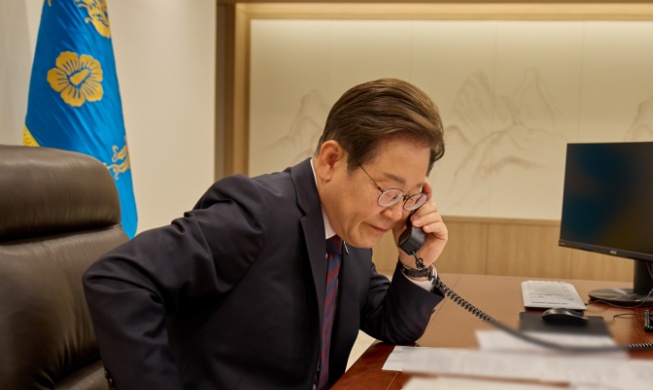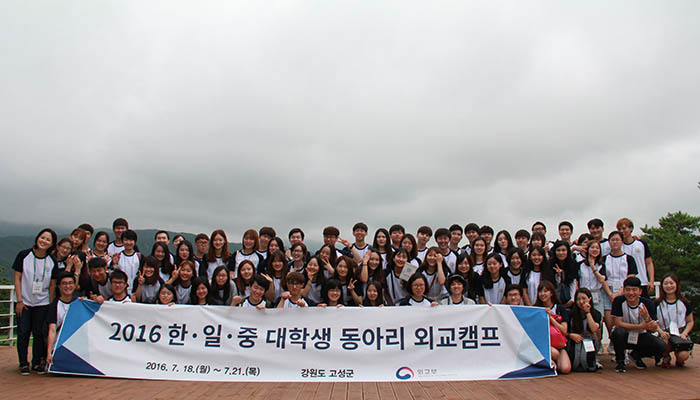
Participants in the '2016 Korea-Japan-China Diplomacy Camp' pose for a picture at the Sokcho Museum in Sokcho, Gangwon-do Province, on July 19.
The town of Goseong in Gangwon-do Province is one of the most popular summer getaway destinations, where the Seoraksan Mountain national park and the beaches of the East Sea eagerly await summer vacationers. Just over the past few weeks, in fact, and along with the neighboring town of Sokcho, Goseong has become one of the most crowded places in Korea due to the fact that a certain location-based smartphone game that has not yet been officially launched in Korea is accessible in those locations. With all this going on, however, and in the shadow of the mountain range, another group has gathered, of Korean, Japanese and Chinese university students.
The students did not, in fact, come to Gangwon-do Province because of the smartphone game. Instead of having their eyes and fingers glued to their mobile screens, these participants in the "2016 Korea-Japan-China Diplomacy Camp" spent most of their time talking with each other and listening to new viewpoints, with their ears open and their eyes sparkling.
The "Korea-Japan-China Diplomacy Camp," in its fifth year this year, is a yearly program hosted by the Korean Ministry of Foreign Affairs. It is solely for Korean, Japanese and Chinese university students and is part of the government's efforts to expand non-governmental partnerships and relationships among people from the three countries. More than 70 Korean, Japanese and Chinese university students studying in Korea, including one Japanese student who flew in from Japan just to join the camp, participated in this year's camp. The participants' passion, excitement and hope for meeting new people, and to eventually learn more about each other, were all clearly visible on the young university students' faces.
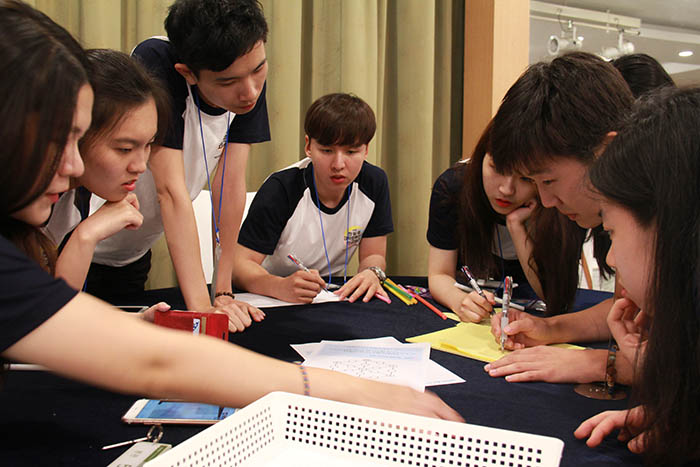
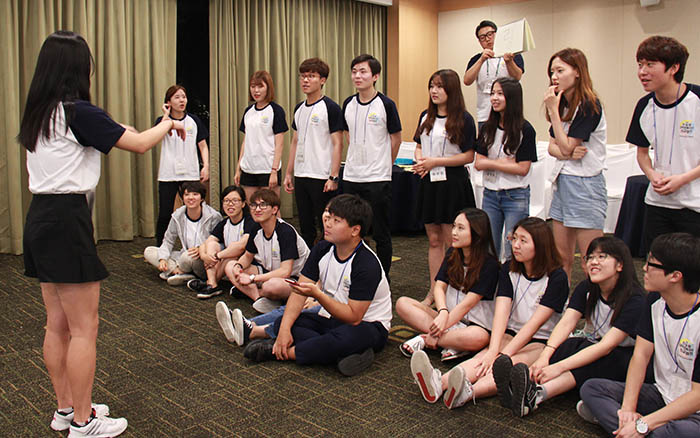
On July 19, the first night of the '2016 Korea-Japan-China Diplomacy Camp,' participants take part in trivia competitions and play charades and other theater sports.
Though the non-Korean participants were able to have simple conversations in Korean, participants were eager to speak in each other's languages as part of efforts to build better communication channels. Sharing their favorite music, movies or experiences traveling to other countries, they quickly became friends.
On July 18, the first night of the camp, participants who had only met each other earlier in the afternoon, became immediate friends after only a few rounds of charades and quizzes. Charades helped them to work on their team work, and the true-or-false quiz, that asked questions like, "The Korean alphabet, Hangeul, was created by King Sejong the Great," or "Leaving some food in the dish after eating is polite table manners in China," helped with the bonding. One Chinese student, Quan Mi, currently doing her master's at Seoul National University in comparative literature, was the queen of the quiz. The winning question was, "What is the term for the region between South Korea and North Korea where there's no military and no army," and her answer was, "DMZ" or the Demilitarized Zone.
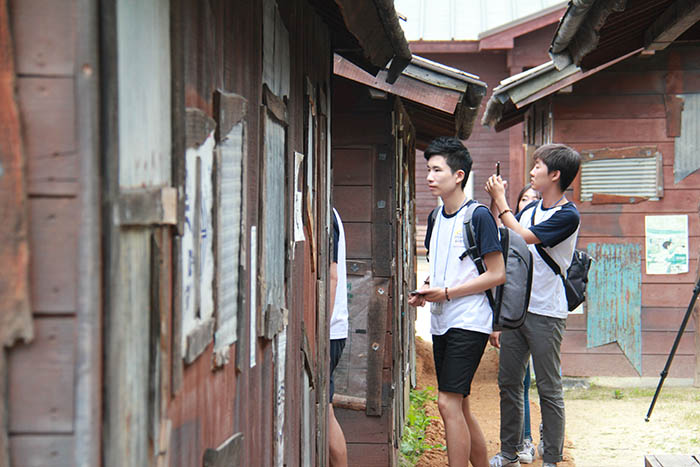
Participants look around a reproduction of a Sokcho shantytown where refugees lived during the Korean War, at the Sokcho Museum on July 19, the second day of the camp.
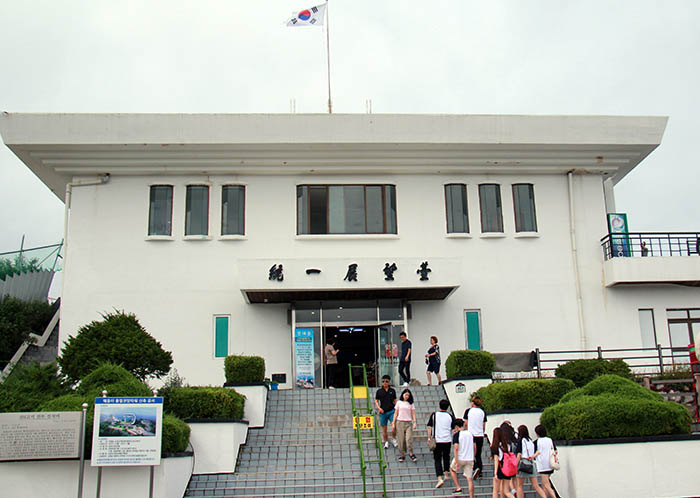
At the Goseong Unification Observatory, participants peer through telescopes into North Korea on July 19, overcome by the oddity and sadness of the situation.
The second day of the camp was time for the university students to learn more about modern Korean history after the Korean War (1950-1953). At the Sokcho Museum, they looked around rooms that displayed pictures of refugees during the war, and at a model of the former refugee shantytown that has now grown and developed into the "Abai Village." In the afternoon, they visited the Goseong Unification Observatory and saw first-hand the present reality of a divided Korean Peninsula. "This is the first time for me to be this close to North Korea," said Hong Wen Chao with a mixture of both excitement and calmness, a student from Shanghai who's currently studying Ancient Korean at the University of Seoul.
On July 20, the third day of the camp, the students, who had to give up on a hike to Seoraksan Mountain due to rain and thick fog, instead enjoyed an afternoon of brainstorming, coming up with suggestions on Korea-Japan-China trilateral cooperation. Some of the ideas that sprouted from these thought exercises included trilateral cooking competitions, online travel information-sharing systems in all three languages, a trilateral joint body to work on environmental cooperation, a scholarship foundation and visa-free travel for the young, suggestions that all reflect the participants' vivid experiences and goals for a prosperous future.

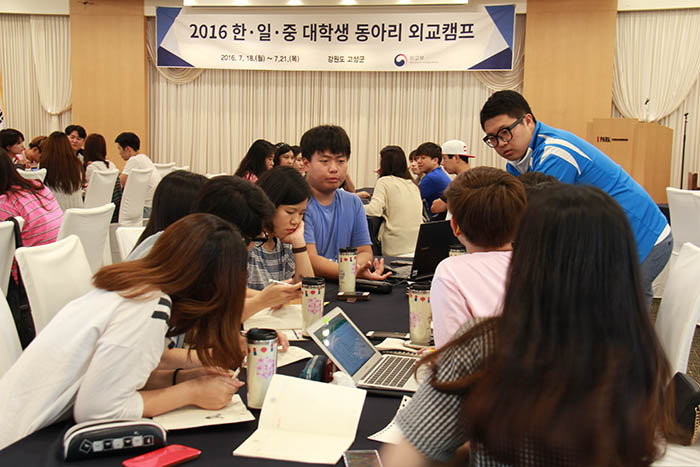
University students discuss trilateral cooperative measures across a broad range of issues, such as cooking, visa-free travel, education and the environment.
"There's one line that I heard a long time ago, but it still lingers in my head. 'If you have one close friend in another country, no war will ever break out.' So when I first came to South Korea, I was determined to make at least one good friend. But now, I've made tons of friends in just a short bit of time, way more than I expected," smiled Matsui Yuki, an exchange student at Incheon National University.
Moon Ji-won, who's studying at Korea University and is keen on diplomatic relations and politics in Northeast Asia, said that the camp was a great opportunity for her "to be able to listen to real voices of Chinese and Japanese students on several issues about Northeast Asia."
The "2016 Korea-Japan-China Diplomacy Camp," one of the few opportunities for young South Korean, Japanese and Chinese students to learn more about each other, wrapped up with a closing ceremony and a joint statement on July 21 after its four-day run.
Alongside the diplomacy camp, the Ministry of Foreign Affairs also runs an invitational program for young students to visit the Trilateral Cooperation Secretariat in Seoul. Also, in the years ahead, the ministry plans to expand such programs, including an upcoming mock trilateral summit and an essay competition, announced the ministry.
By Chang Iou-chung / Korea.net Staff Writer
icchang@korea.kr
Most popular
- Military discharge sets stage for reunion of all 7 BTS members
- BTS to mark 12th anniversary of debut with 2-week festival
- Lee Jae-myung officially sworn in as nation's 21st president
- Presidents Lee, Trump discuss tariff deal in first phone talks
- President's 1st executive order is launch of economic task force
